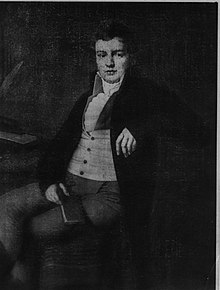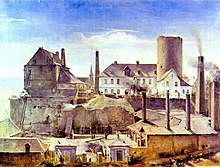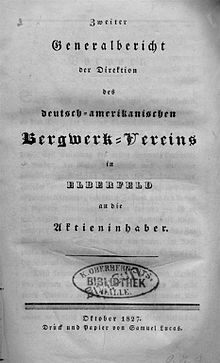Heinrich Kamp
Heinrich Kamp (born November 8, 1786 in Baerl , † February 16, 1853 in Berlin ) was a German businessman, banker and industrialist from Elberfeld .
Life
Johann Heinrich Daniel Kamp was born as the son of pastor Daniel Kamp and his wife Maria Katharina Gertrud Koenigs. Daniel Kamp was pastor at the Reformed congregations in Jüchen and Baerl since 1779 . In 1789 he received a call to the Reformed community in Elberfeld as the successor to Pastor Dionysius Eickel . His wife Maria Katharina Gertrud Koenigs died a few months after the birth of their only child, Heinrich Kamp, on August 28, 1787 in Baerl. Daniel Kamp married Anna Christina Wilhelmina Noot in 1792 and had six other children with her. Heinrich Kamp was the sole heir to the grandfather's fortune, which was probably considerable.
Heinrich Kamp grew up in Elberfeld. It is not known which school he attended. But he must have completed his training in the company of his future father, Johann Heinrich Brinck, a cotton and Siamosenfabrik possessed, which over the years to Bankhaus JH Brinck & Co. transformed. Heinrich Kamp married Henrietta Brinck on September 27, 1808. Thanks to his inherited fortune, Heinrich Kamp was able to participate in this bank and he made contact with the inner circle of the Elberfeld leadership, especially with his new brother-in-law, Johann Jakob Aders , former mayor of Elberfeld and energetic entrepreneur with family ties to England . Heinrich Kamp also traveled frequently to England and studied the technical and industrial revolution there, which was already well advanced there.
Entrepreneurial activity
When Heinrich Kamp joined the JH Brinck & Co. banking house in 1808, the Bergisches Land economy almost came to a complete standstill. Due to the continental blockade of 1806 , the ban on exporting goods to France and finally the annexation of Holland, the Bergisch entrepreneurs no longer had the opportunity to send goods abroad. Therefore, on April 1, 1811, they sent a petition to Napoléon with the request to unite the Duchy of Berg with France: “ Yes, Sire! A single wish, a single desire enlivens the hearts of the people of the Grand Duchy, it is to be united with the Empire. ” Kamp was among the signatories as Henry Kamp. This petition was of course unsuccessful and so the economic success of the Wuppertal only began with the collapse of the Empire, the annexation to Prussia and with the customs law of 1818.
Mechanical workshops Harkort & Co.
The best-known company in which Heinrich Kamp participated was the establishment of the Mechanische Werkstätten Harkort & Co. Heinrich Kamp met Friedrich Harkort in the house of his brother-in-law Aders and with this technical visionary he founded the Mechanische Werkstätten Harkort & Co. on September 18, 1819 the Castle weather at the Ruhr for the production of steam engines in the English style. Harkort traveled to England to recruit workers and buy machines, Heinrich Kamp worked primarily as a financier. The first steam engines were sold as early as 1820, making the company one of the first machine factories in Prussia . More companies had to be founded. A puddling mill and a rolling mill as well as iron and steel works were added, the number of workers rose from 14 in 1825 to 94. The Harkort & Co. mechanical workshops were among the leading companies in Prussia in the 1820s Promoted industrialization, recognized the opportunities of mechanization and industrialization and thus found connection to the then leading industrial nation England.
A lack of capital, technical difficulties with ever-increasing customer demands, late payments after deliveries and commercial mishaps led to almost bankruptcy. Harkort had to leave in 1834 and Heinrich Kamp took over the mechanical workshops, now Kamp & Co., on his own until he handed them over to his sons and sons-in-law in 1851. It was a forerunner of Demag AG. In 1827 Kamp received the Red Eagle Order, third class, for his services to this company .
Rhenish-West India Company
Heinrich Kamp also showed himself to be a visionary when he participated in the third joint stock company in Prussia, the Rheinisch-Westindische Kompagnie founded on March 8, 1821 . This was based on the desire for entrepreneurs from Berg for new sales channels for their textile products and to maintain their competitiveness against English products through a merger. In the statutes of the Rheinisch-Westindische Compagnie under § 1:
" The company is formed for the purpose of exporting patriotic art and natural products and will therefore operate business to the West Indies, North and South America, or to other parts of the world ... under the company Rheinisch-Westindische Compagnie ."
Branches were established in Port-au-Prince in Haiti , Mexico , Buenos Aires and Chile . In the first few years the profit rose steadily, so that even the Prussian king took part with 500 shares of 500 talers each . But after initial gains, there were setbacks. In 1831 it was decided to liquidate the company with a loss of around 60% of the paid-in capital. The process took twelve years to complete. Heinrich Kamp was the keeper of the minutes at the inaugural meeting, prepared reports on amendments to the statutes and he was chairman of the general assembly of 1828 and 1833.
German-American Mining Association
Encouraged by the initial success of the Rheinisch-Westindische Compagnie, Heinrich Kamp also participated in the German-American Mining Association founded on January 1, 1824 . German agents had reported incredible profit opportunities in the silver mines of Mexico and so the demand for the shares was great. The statutes were based on those of the Rheinisch-Westindische Kompagnie. The mining assessor Wilhelm Stein from Siegerland was hired for 1,000 thalers a year and sent to Mexico to buy and explore silver mines. Heinrich Kamp was one of the first directors of the association. The initial euphoria was so great that by 1827 around 30 silver and gold mines and three smelters were acquired. The repair of the dilapidated pits, however, cost significantly more money than expected, there was a lack of trained workers and the yield fell far short of expectations. Above all, there was a lack of responsible management and control. Finally in 1837 bankruptcy had to be filed with the loss of a large part of the capital invested.
Fire insurance Colonia
From 1839 to 1847 Kamp was the first director of the newly founded fire insurance company Colonia in Cologne, after having helped found the Vaterländische Feuerversicherungsgesellschaft in 1822 .
Heinrich Kamp ran a cotton machine factory (1827–1831), a foundry and the windmill on the Hardt for his own account.
Chamber of Commerce Elberfeld and Barmen
The association for the promotion of industry in Prussia was founded on January 15, 1821 under the leadership of Christian Peter Wilhelm Beuth in Berlin . Heinrich Kamp has been there since it was founded, but certainly saw the necessity of joint action by the leading entrepreneurs of the Wuppertal after the complete decline of the Bergisch industry due to the Napoleonic wars, a separate mouthpiece for the economy. First attempts to establish a chamber of commerce failed due to government resistance, but were increasingly persecuted by Heinrich Kamp from 1826 onwards. A committee made up of entrepreneurs from Elberfeld and Barmer drew up statutes for the establishment of a chamber of commerce, the members of which were to emerge from free elections and were allowed to elect a president themselves. After lengthy negotiations with the government, the statute of the Chamber of Commerce of Elberfeld and Barmen of June 22, 1830 was finally approved and Heinrich Kamp was elected as the first president. The importance of this Chamber of Commerce shows in the large number of voters. 430 merchants were added to the lists. The Chamber of Commerce of Elberfeld and Barmen was considered to be a trailblazer for the subsequent establishment of a large number of other chambers of commerce in Prussia. Heinrich Kamp was available to the Chamber of Commerce for three years as president during this difficult economic time, until in 1833 he moved his residence first to Wetter an der Ruhr and then to Jülich on his Königskamp estate.
The IHK Wuppertal is still located on Heinrich-Kamp-Platz today.
Heinrich Kamp was a member of the First Society , a meeting place for like-minded entrepreneurs. On June 28, 1818, it merged with the social institute Museum . This association should be the center of the literary, scientific and artistic life of Elberfeld. He was closely related to the Freemason Lodge "Hermann of the Land of the Mountains". While a large number of Elberfeld entrepreneurs were members of the lodge, this cannot be attested to with Heinrich Kamp.
Political activity
In addition to his extensive work as an entrepreneur and shareholder, Heinrich Kamp had been a city councilor and alderman in Elberfeld since 1816 . In 1822 he resigned from these offices because of differences of opinion with the mayor of Brüning. But he was still head of the Elberfeld stock exchange . Elected as a member of the Rhenish Provincial Parliament in 1826 , he was sent to Berlin as a deputy in 1827. He fought here to keep the Code Napoléon . Here he also had close contact with Freiherr von Stein . His special political focus here was the implementation of free navigation on the Rhine, as well as the dismantling of trade barriers in general. Furthermore, his special concern was the expansion of the railway lines. In this context he was a representative of the Rhine Province at the consultation of the United States Committees in 1842, at which the support of the state in railway construction was discussed.
After he moved his residence to Jülich and finally to Cologne , he was sent to the Prussian mansion as a representative of Cologne , where he worked for another ten years. During one session he died in Berlin on February 16, 1853. He was buried in the Halle cemetery . The iron cross above the burial place was made by the mechanical workshops in Wetter.
family
Henrietta Kamp, b. Brinck died about a year after her husband on March 15, 1854 in Cologne. She had given birth to 7 sons and 7 daughters, including:
- Marie Elisabeth (1818–1897) ∞ Ernst Wilhelm Schuler von Senden (1812–1899), whose descendants include Alexander von Falkenhausen
- Emilie (June 19, 1809 - January 21, 1871) ∞ Julius Blank (July 4, 1803 - August 18, 1865), entrepreneur
- Hermann (November 8, 1813 - September 3, 1891), mining industrialist ∞ Pauline Möllenhoff (June 30, 1820 - November 18, 1892), parents of Wilhelm Heinrich Kamp (1841–1927)
literature
- Eugen Blank: Family tree of the Kamp family , Vohwinkel 1929.
- Erich Breitenbach: The development of the casino company in Elberfeld , Elberfeld 1927.
- Klaus Herdepe : Heinrich Kamp (1786-1853). In: Wolfhard Weber (Ed.) Bergisch-Märkische entrepreneurs of the early industrialization. (= Rheinisch-Westfälische Wirtschaftsbiographien , Volume 18.) Aschendorff, Münster 2004, pp. 299-318.
- Astrid Hermann: The establishment of the German-American Mining Association
- Hans Kruse: German letters from Mexico with a history of the German-American mining association 1824–1838 , Essen 1923
- Hans-Joachim Oehm: The Rheinisch-Westindische Compagnie , Neustadt an der Aisch 1968
- Jürgen Reulecke: Heinrich Kamp. In: New German Biography (NDB). Volume 11, Duncker & Humblot, Berlin 1977, ISBN 3-428-00192-3 , p. 87 ( digitized version ).
- Eugen Schmal: Heinrich Daniel Kamp
- Dieter Schweitzer: History and beginnings of economic self-government in the Wupper Valley 1826–1934 , Wuppertal 1980.
- Ders .: Heinrich Kamp, an almost forgotten great Wuppertal man
- Statutes of the Rheinisch-Westindische Compagnie of November 7th, 1821 published in the official gazette of the government of Düsseldorf No. 72 of December 24th, 1821.
Individual evidence
- ↑ a b Entry by tradespeople in the Grand Duchy of Berg 1811. (No longer available online.) Landschaftsverband Westfalen-Lippe , archived from the original on December 27, 2014 ; accessed on December 27, 2014 (part of the exhibition “Departure into Modernism - The Example of Westphalia”). Info: The archive link was inserted automatically and has not yet been checked. Please check the original and archive link according to the instructions and then remove this notice.
- ↑ Tabular overview: History of the Chamber of Industry and Commerce (IHK) Wuppertal-Solingen-Remscheid. (No longer available online.) IHK Wuppertal-Solingen-Remscheid , archived from the original on December 27, 2014 ; accessed on December 27, 2014 . Info: The archive link was inserted automatically and has not yet been checked. Please check the original and archive link according to the instructions and then remove this notice.
- ↑ Archive link ( Memento of the original from January 3, 2017 in the Internet Archive ) Info: The archive link was inserted automatically and has not yet been checked. Please check the original and archive link according to the instructions and then remove this notice.
- ^ A sister of Friedrich Engels , Maria Engels * July 13, 1824 in Barmen, was married to a cousin of Julius Blank.
| personal data | |
|---|---|
| SURNAME | Kamp, Heinrich |
| BRIEF DESCRIPTION | German entrepreneur |
| DATE OF BIRTH | November 8, 1786 |
| PLACE OF BIRTH | Baerl |
| DATE OF DEATH | February 16, 1853 |
| Place of death | Berlin |






